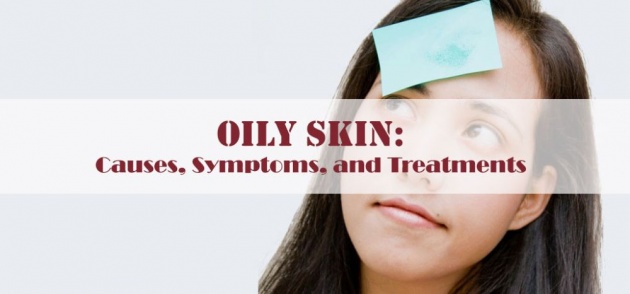
Image Credit: http://thegirlside.com/
Our last topic was all about dry skin. So, today, we're going to talk about the causes of oily skin and how to treat it. Oily skin is a problem that mostly afflicts teenagers who are going through puberty, but anyone at any age can be afflicted with this skin condition. Although not serious, it is very uncomfortable and is a cause of blemishes and acne breakouts.
⚜ Quick Overview on Oily Skin ⚜
Oily skin is the product of the overproduction of sebum, an oily substance made from fats, from the sebaceous glands, located underneath the surface of the skin. Although sebum causes oily skin, it is not all bad since it does help moisturize and protect the skin, as well as keep your hair shiny and healthy. The problem arises only when there is an overproduction of this substance. Too much sebum can actually clog pores and cause acne breakouts.
It's not easy to manage oily skin. However, there are certain oily skin home remedies that can help reduce the symptoms without the use of expensive skin care products or prescription drugs.
⚜ Causes ⚜
Oily skin can be caused by several factors. Here are some of the most common ones.
⚜ Genetics

Image Credit: https://www.popsci.com/
Genetics is often the cause of oily skin and, as we all know, genes cannot be altered. Your genes dictate how much sebum your sebaceous glands produce, so it also dictates how oily your skin will be. So does that mean that you'll have to live in despair with an oily skin for the rest of your life? Not necessarily. While you cannot change the structure of your genes, there are certain ways you can try to help manage the increase of oil production, such as proper skin care and a healthy diet and lifestyle.
⚜ Hormonal imbalance
Drastic changes in your hormones can be blamed for many conditions and oily skin is one of them. Hormonal imbalances may be caused by a number of factors such as pregnancy, menstrual cycle, birth control pills, exercise, diet, and menopause. These changes in the hormones can cause the sebaceous glands to go into overdrive and produce way more sebum than it has to which leads to the greasy feeling on the outer layer of the skin.
⚜ Chronic stress

Image CreditL johnhain via Pixabay
Too much stress can take its toll on our mental and physical health. But, did you know that it can also increase the production of oil in our skin? Shocking, right? Apparently, when there is a spike in the body's stress hormone called cortisol, the oil production of the body can also increase.
⚜ Foods you eat
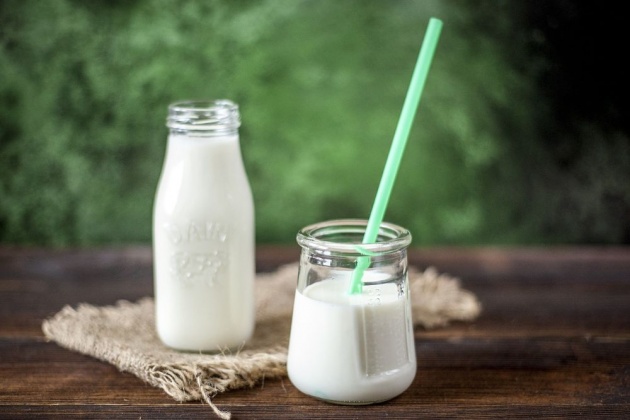
Image Credit: Imoflow via Pixabay
The foods you eat can also contribute to the body's overproduction of sebum. For example, studies have shown that dairy products such as milk, yogurt, cheese, and butter actually stimulate the oil glands of the skin. It may even lead to acne. These products have a number of hormones that can cause an imbalance--and as pointed out before, hormonal imbalance is one of the major causes of oily skin.
⚜ Applying the wrong moisturizer and sunscreen
Everyone should moisturize and apply sunscreen regardless of skin type. However, not all moisturizers and sunscreens are created the same. This is because some of these products are actually geared for dry skin so they can leave a greasy residue on the skin which can aggravate your oily skin problem.
⚜ The weather

Image Credit: http://www.1011now.com/content/
Just like with dry skin, the weather also causes the skin to produce more oil than usual. But, unlike dry skin that is caused by cold weathers, oily skin is caused by hot, humid, or rainy weather. If you live in such a place--like the Philippines--you can't really control how hot the weather gets. What you can do is to bring blotting papers to help control the oil instead.
⚜ Wearing heavy makeup
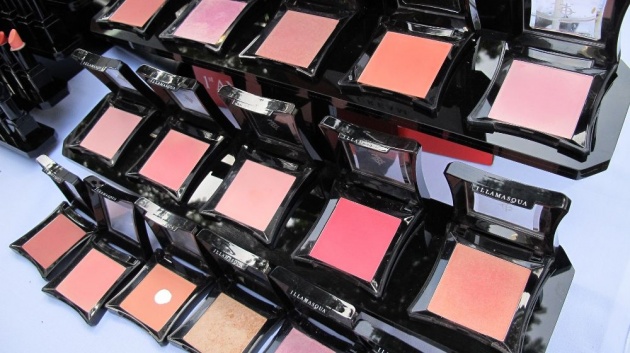
Image Credit: aerngaoey via Pixabay
When you have many skin blemishes, it may be tempting to put on a lot of makeup to cover your skin. However, heavy, full-coverage makeups block pores hence increasing oil production of the skin. If you really want to put on makeup, look for lighter textures labeled with "oil control" or "mattifying".
⚜ Symptoms ⚜
Oily skin usually affects the face and the symptoms may include one or more of the following.
- Genetics
- Hormonal imbalance
- Chronic stress
- A greasy or shiny appearance of the face
- The skin's pores are very large and obvious
- The skin may look rough or thick
- Acne breakouts
- Blackheads and clogged pores
The severity and symptoms of oily skin may vary from person to person. Additionally, finding the right makeup may be a little difficult for people with oily skin as the makeup can mix with the sebum giving it a different consistency.
⚜ How to Manage Oily Skin ⚜
Treating oily skin permanently is very difficult--it may even be impossible, especially if it's genetic. However, controlling oil production is not impossible. Try these simple remedies.
⚜ Wash regularly

Image Credit: https://www.eve.com.mt/
People with oily skin can benefit from regularly washing their skin as it can help control the amount of oil produced. But, don't just wash your face--do it the right way.
- Wash with a mild soap or cleanser and warm water.
- Soaps with added fragrances, harsh chemicals, and moisturizers can irritate and dry out the skin causing it to produce more oil as a counter-reaction.
- Rough washcloths and loofas add friction to the skin thereby stimulating more oil production.
If the above measures do not do the trick, you can try medicated acne care products. These products usually contain acids that help strip away the extra oil on your skin. These acids include salicylic acid, glycolic acid, beta-hydroxy acid, and benzoyl peroxide. These acids may irritate some skin types, so it's important to test it out on a small part of your skin first like the back of your hands to see how your skin reacts to it. If your problem is just oily skin sans acne, you can use warm water and glycerin soap that is fragrance-free.
⚜ Use a toner made from natural ingredients
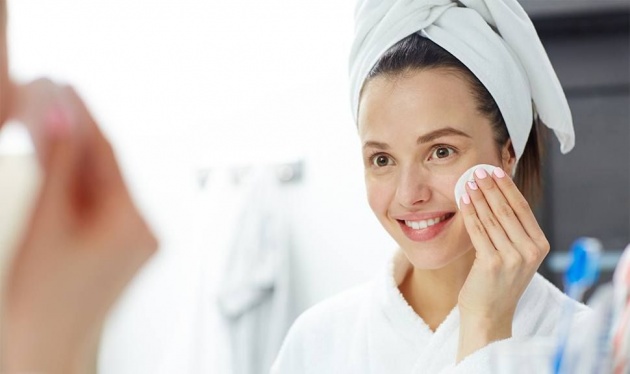
image Credit: https://www.skincare.com/
It's important to use toners after cleansing your skin to get rid of any dirt or makeup residue. However, most astringent toners contain alcohol which can dry out the skin. This is why it's important to choose toners made from natural ingredients such as witch hazel. For some people, a toner can help remove small bits of makeup that clogs the pores and may even make enlarged pores seem smaller. However, the sad reality is that toners are not meant for everyone. Some people may experience tingling and itching when they apply a toner to their face. Such irritation can cause more oil production. When trying out a new product, always do a patch skin test first to check its compatibility with your skin.
⚜ Gently pat the face dry

Image Credit: https://www.indianbeauty.tips/
When drying your face, make sure that you do not pull the towel down on the skin too harshly as it may create more sebum as a result. Likewise, do not use rough towels. What you should do instead is to gently pat your face dry with a soft towel after washing or using toner.
⚜ Use medicated pads and blotting papers
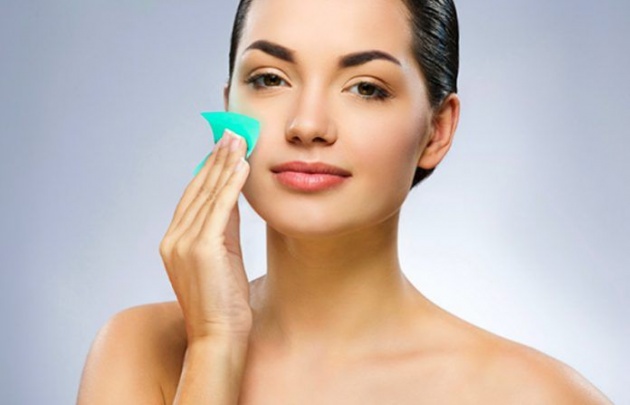
Image Credit: https://www.smarthomekeeping.com/
Blotting papers are super absorbent papers that are very helpful when it comes to managing sebum production. However, they are not meant to treat oily skin permanently. They only help remove excess oil from the skin so it doesn't look too shiny--but it has to be done all throughout the day.
If you're not sold on the idea of blotting papers, you can try medicated cloth pads. These pads contain glycolic acid or salicylic acid which can help control the overproduction of sebum on your face--and it does that while cleaning your pores! But like blotting papers, you have to use these pads as many times as necessary throughout the day.
Watch this video for more ideas on how to control your oily skin.
Video Credit: alpha m. via Youtube
⚜ Final Thoughts ⚜
Having an oily skin is hardly a serious condition, but it is super uncomfortable. It may also be difficult to manage at times, but controlling the overproduction of sebum is possible--you just need the right products. Make sure to check the ingredients of many skin care or makeup products you are buying to avoid worsening your oily skin problem.
~oO0Oo~~oO0Oo~~oO0Oo~~
Thanks for reading! Have a wonderful day ahead of you and keep smiling. :)
Written by Chineyes for bitLanders
For more quality blog posts, you may visit my page
Not yet on bitLanders? Sign up now and be rewarded for sharing ideas, photos, and videos!



